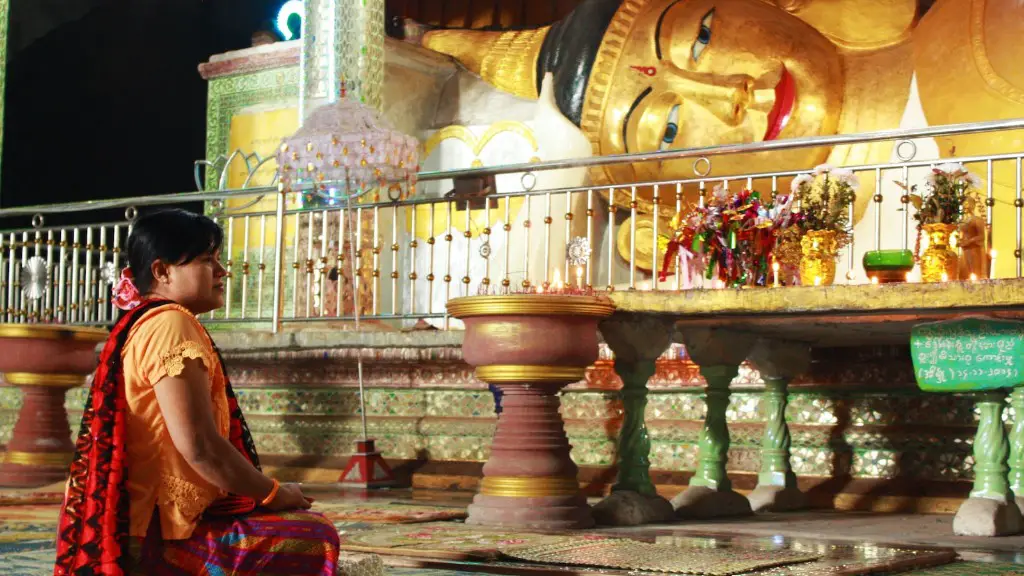Is Hinduism Believe In One God?
Hinduism, the world’s oldest religion, is an ancient set of beliefs and practices originating in India. It is often described as a “way of life” rather than a religion, and is said to have no single founder or spiritual leader. At the core of Hinduism is the belief there is one Spirit or universal consciousness that manifests in a variety of forms. As such, Hindus often recognize multiple gods and goddesses but only focus on one or a few deities as their personal deity. This belief has been the source of longer and more heated debate as to whether or not Hinduism is monotheistic or not.
The Rig Veda, the oldest scriptural text of Hinduism from the 2nd millennium BC, states that there is one “Supreme Being” and several other minor gods or goddesses. This has caused some to debate Hinduism’s spiritual nature and whether it is truly monotheistic. While the Rig Veda does refer to the “Supreme Being,” it also defines the other gods and goddesses as expressions of this single God. Similarly, the Upanishads, scriptures written in the 5th century BC, refer to one Supreme Being as the source of all creation, while still allowing the worship of various gods and goddesses. This has led some to argue that Hinduism is not monotheistic, but rather that it is polytheistic.
To further complicate matters, other Hindu texts referred to as “The Puranas” state that all gods and goddesses are aspects of one single deity. For example, the Vishnu Purana states that Vishnu is the creator, preserver and destroyer of the universe, but he is also one aspect of the “Supreme Being” from the Rig Veda. Likewise, the Devi Gita states that different goddesses are manifestations of one absolute deity. These texts have led some to believe that Hinduism is a mix of monotheism and polytheism, while others argue that it is neither of the two.
Regardless of its spiritual nature, all Hindus follow the same basic belief structure. All Hindus have an underlying belief in the unity of all life, regardless of the individual faith practices of each Hindu. In order to honor this belief, Hindus worship various gods and goddesses as manifestations of one single “Supreme Being.” This practice of honoring multiple gods and goddesses has caused some to debate whether or not Hinduism is truly monotheistic.
Despite the different viewpoints on its spiritual nature, Hinduism remains one of the oldest surviving faiths in the world. As such, it is important to understand the diversity of beliefs in its practices and to respect the spiritual beliefs and practices of all Hindus, regardless of whether one believes Hinduism is truly monotheistic or not.
Hinduism and Different Paths to Enlightenment
One of the defining features of Hinduism is its emphasis on understanding the interconnectedness of life and the universe. Hindus seek to honor and respect the earth, as well as to understand the divine nature of the universe. In order to reach this goal, Hindus have many different paths they can take to reach enlightenment, or a state of understanding the spiritual nature of the universe.
Hindus can choose from several different paths, such as Bhakti (devotion), Jnana (knowledge), and Karma (action). Each one has its own unique set of beliefs, practices, and methods for achieving enlightenment. Devotion involves intense spiritual practice and the worship of one or several gods and goddesses. Knowledge involves understanding the spiritual aspects of the universe through study, meditation, and reflection. Action requires one to act in accordance with the teachings of Hinduism, such as advocating for justice and helping others.
Hindus believe that every individual is free to choose their own path, and that whatever works best for them is the most valid. This belief has been described as “multiple paths, one goal” and is used to describe the way Hindus seek to reach a state of spiritual harmony. As such, the goal of each path is to ultimately achieve a connection to the divine.
Whether or not one chooses to follow one of these paths, it is important to remember that the ultimate goal of Hinduism is to seek harmony with the divine nature of the universe. Hindus believe in the interconnectedness of all things, and thus honor and respect the spiritual beliefs of everyone.
Nature and Environmentalism
Hinduism stresses the importance of respecting nature in order to maintain the balance of the universe. Hindus believe that the cosmos and all its components are interconnected and part of a larger, living whole. Thus, it is important to honor and respect the earth in order to uphold the balance of the universe. As such, Hindus practice various rituals and customs in order to protect and nurture the environment, such as conserving natural resources and avoiding the excessive use of technology.
One of the most important rituals Hindus practice is called the Garuda Kalasha, or the “measure of the garuda bird.” This involves filling a pot with sacred water and offering prayers to various gods and goddesses. The pot is then buried in a river or other body of water to bring good fortune and prosperity. This practice has been used for thousands of years and is intended to show respect to nature and all its elements. Other rituals might also be practiced, such as worshipping trees, using organic agriculture, and honoring animals. All of these rituals are intended to protect and nurture the environment and to honor the divine presence.
Environmentalism is an important part of Hinduism, and there are a variety of ways of showing reverence for the environment. Hindus seek to maintain the balance of the universe by respecting nature and all its elements. Through various rituals and customs, they seek to nurture and protect the environment while also honoring the divine presence in nature. By doing so, Hindus believe that they can reach a state of harmony and unity with the divine nature of the universe.
Hinduism and Social Issues
Hinduism has a long history of advocating for social justice and care for those in need. Hindu texts such as the Ramayana and Mahabharata were written during ancient times and centered on important social issues such as statecraft, justice, and tolerance. These texts also emphasize the importance of ethics, religious duties, justice, and mercy. Alongside these spiritual and literary texts, several social practices have been developed to promote peace and justice in Hindu society.
One of the major practices is the Caste System, which is based on the belief that each individual has their own path in life. Hindus have long upheld the idea that an individual’s social status is a reflection of their spiritual status, and thus they should strive to uphold their “dharma” or spiritual obligations. This system has both positive and negative aspects, but it is generally used in order to promote peace, justice, and harmony in Hindu society.
Hindus also value charity and compassion. Over the last few centuries, Hindu religious organizations have worked to alleviate poverty by developing hospitals, schools, and charitable trusts. These organizations have been particularly active in providing relief to those affected by natural disasters and working to end inequality and injustice.
Hinduism has long played an important role in addressing social issues, and its commitment to peace, justice, and equality should be respected. It has a rich history of advocating for those in need and its spiritual beliefs can help us make sense of the complex ethical and moral dilemmas we currently face in society.
Concepts of Karma, Dharma, and Reincarnation
In Hinduism, karma, dharma, and reincarnation are three interrelated concepts that describe the idea of “life” and the soul’s journey through the universe. According to Hindu teachings, karma is the force of cause and effect, dharma is an individual’s ethical obligations to society, and reincarnation describes the soul’s progression through many successive lives. Each of these concepts helps to form the philosophical and spiritual foundations of Hinduism.
Karma is a fundamental belief of Hinduism and refers to the idea that each individual’s past deeds and their effects (or karma) determine their present circumstances. Souls are said to cycle through different incarnations according to their past karma, and it is believed that the soul can ultimately redeem itself from the cycle of karma and suffering. Dharma, or divine law, is the code of conduct each individual should follow in order to reach spiritual liberation. Following dharma helps souls to fulfill their spiritual obligations and to progress through the cycle of reincarnation.
Finally, reincarnation is the belief that each individual’s soul progresses through different lives and bodies in an effort to reach spiritual liberation. Depending on their past karma, a soul may be born as an animal or a human, or even into various socioeconomic strata. The soul is believed to continue the cycle until it reaches a state of enlightenment and the ultimate goal of liberation.
Karma, dharma, and reincarnation form the backbone of Hinduism, and Hindus strive to live their lives according to these concepts in order to achieve spiritual growth. By understanding these concepts, Hindus can learn more about the importance of morality, justice, and compassion in their lives.




